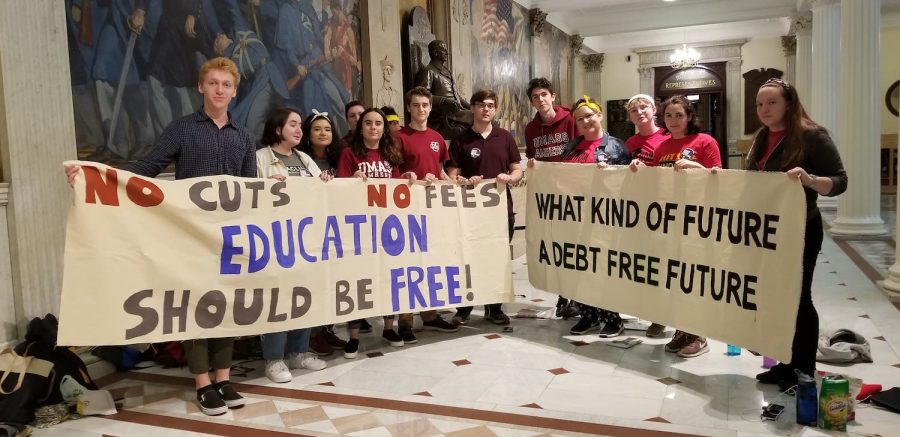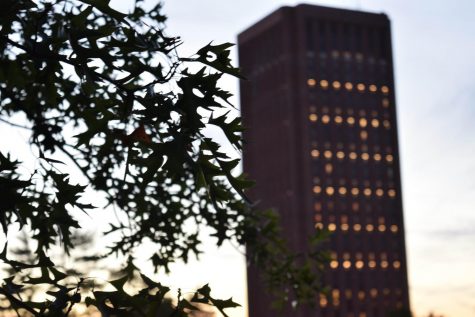UMass students hold sit-in at State House
Students plan on returning to the State House everyday until they secure a meeting with two prominent Massachusetts politicians.
(Brian Choquet/ Amherst Wire)
BOSTON – School is finally out at the University of Massachusetts Amherst, but outspoken students aren’t taking a break when it comes to advocating against the student debt crisis in America.
In an effort to fight for more state funding towards higher education, UMass students have organized a sit-in at the Massachusetts State House that began May 16. They’re also rallying support for the “Debt Free Future Act” (S 744, H 1221), a bill that would create a grant program to cover tuition and fees for all public colleges in Massachusetts for state-residents.
The sit-in was prompted by the Senate Ways and Means Committee’s 2020 budget proposal, which proposed a tuition freeze for Massachusetts public universities. If passed, UMass Amherst would face an $8.2 million deficit for the next school year and be forced to make cuts to programs such as financial aid.
For two days, students have hunkered themselves down inside the halls of the State House from around 9 a.m. until its closing at 5 p.m. — all in the hopes to secure more state funding for UMass while also keeping tuition frozen.
“It’s really outrageous that the state is taking this opposite stance than what they should be and not valuing the merits of public education like they should be,” said rising UMass sophomore Tamar Stollman. Like many who are taking part in the sit-in, she is a member UMass’ Center for Education Policy & Advocacy and The Public Higher Education Network of Massachusetts.
Good morning, @KarenSpilka!
Since you weren’t able to find time to meet with students yesterday, we came back! Will you meet with us today to talk about the UMass budget and the Debt Free Future Act? pic.twitter.com/lUL3FCZFtv
— Timmy Sullivan ? #GreenNewDeal (@TimmySull1van) May 17, 2019
According to Stollman, their civil disobedience will continue until they meet with Senate President Karen Spilka and Speaker of the House Robert DeLeo. However, neither have been taking the group seriously and despite students making themselves hard to ignore, Spilka and DeLeo have been doing just that.
“[Senator Karen Spilka’s] office, they just keep saying she has no time,” said Stollman as we sat just feet away from Spilka’s office doors. “She needs to make time because we’re not going to leave until we do get this meeting.”
"Do you think it's productive to do a sit-in?" The Office of @speakerdeleo asks students. We have called, lobbied, and advocated for years, yet the House still refuses to pass the Debt Free Future Act. It isn't productive for our legislative leadership to ignore students' needs pic.twitter.com/wFZPGm6Bq3
— James (@J_chords) May 17, 2019
So far, Stollman, along with others, have made multiple phone calls to each office, but have mostly been subjected to back and forth conversations with staff members.
To help secure meetings, Stollman says they’re talking with other legislators who could request meetings on their behalf. It’s a workaround that shows the lack of value students have in the legislative process.
“If there are no student voices in the discussion, then how well are you doing your job,” Stollman said.
Despite this lack of progress, students have found joy in what many would think would be a mundane situation. Even at the five-hour mark on their second day, there were still soft sounds of laughter and friendly conversations amongst the tight-knit group.
“I was really dreading [the sit-in], but it’s been good. We have a great group of people,” Stollman said. “I really feel like I’m part of something a lot bigger than myself and I really enjoy being able to advocate for students who have to work full-time when they’re not in school and cannot be here today.”

"The hero of my tale–whom I love with all the power of my soul, whom I have tried to portray in all its beauty, who has been, is, and always will be...










